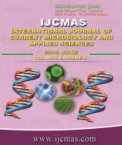


 National Academy of Agricultural Sciences (NAAS)
National Academy of Agricultural Sciences (NAAS)

|
PRINT ISSN : 2319-7692
Online ISSN : 2319-7706 Issues : 12 per year Publisher : Excellent Publishers Email : editorijcmas@gmail.com / submit@ijcmas.com Editor-in-chief: Dr.M.Prakash Index Copernicus ICV 2018: 95.39 NAAS RATING 2020: 5.38 |
High temperature stress is one of the most detrimental abiotic stresses which adversely affect productivity of maize (Zea mays L.) in tropics and subtropics. Plants respond to high temperature stress by regulating expression of an array of genes, heat shock proteins (HSPs) being one of them. Owing to highly differential expression of HSPs in various crop species under high temperature stress, these could be considered as key stress responsive genes. Since HSPs gene family contain various members, identification of specific gene(s) playing crucial role in heat stress tolerance could be beneficial for developing stress resilient genotypes. Here we report in-silico characterization of five HSP genes and their expression analysis in two contrasting maize inbred lines i.e. LM17 (heat tolerant) and HKI1015WG8 (heat susceptible) subjected to high temperature stress at seedling stage. The five maize specific HSP genes, viz., ZmHsp26, ZmHsp60, ZmHsp70, ZmHsp82 and ZmHsp101 exhibited distinctive expression pattern in response to heat stress. Higher up-regulation of ZmHsp70 was found throughout the stress exposure in the heat tolerant line as compared to the susceptible line. Sharp up-regulation and rapid decline in expression of ZmHsp82 in LM17 than HKI1015WG8 after 12 hours heat stress exposure suggested its possible role in plant acclimatization to heat-stress conditions. Further, higher up-regulation of ZmHsp101 even after removal of stress (recovery for 24 hrs) indicated its possible role in recovering plant from adverse effects of heat stress. The study opens up scope for investigation through transgenic (RNAi and/or over expression) approach to further characterize and elucidate precise role of ZmHsp101, ZmHsp82 and ZmHsp70 in heat stress tolerance in maize.
 |
 |
 |
 |
 |